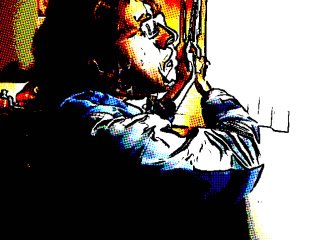" are extremely basic symbol-manipulating devices which — despite their simplicity — can be adapted to simulate the logic of any computer that could possibly be constructed. They were described in 1936 by Alan Turing. Though they were intended to be technically feasible, Turing machines were not meant to be a practical computing technology, but a thought experiment about the limits of mechanical computation; thus they were not actually constructed. Studying their abstract properties yields many insights into computer science and complexity theory.
A Turing machine that is able to simulate any other Turing machine is called a Universal Turing machine (UTM, or simply a universal machine). A more mathematically-oriented definition with a similar "universal" nature was introduced by Alonzo Church, whose work on lambda calculus intertwined with Turing's in a formal theory of computation known as the Church–Turing thesis. The thesis states that Turing machines indeed capture the informal notion of effective method in logic and mathematics, and provide a precise definition of an algorithm or 'mechanical procedure'."
disponible en http://en.wikipedia.org/wiki/Turing_machine
La democracia se ha fundado sobre el poder de la mayoría, lógica de la ética capitalista de Stuart Mill, no en la capacidad de discernir. La institución busca cómodamente la entropía social sin asumir responsabilidades. Impera la lógica de la supervivencia, pantalla del mundo real. Los medios digitales son armas democráticas contra las instituciones y sus parásitos. La guerra no tendrá lugar. somos habitantes electrónicos, inforgs re-diseñando el mundo. "The Revolution Will Not Be Televised"
11.10.06
9.10.06
free software

We maintain this free software definition to show clearly what must be true about a particular software program for it to be considered free software.
``Free software'' is a matter of liberty, not price. To understand the concept, you should think of ``free'' as in ``free speech,'' not as in ``free beer.''
Free software is a matter of the users' freedom to run, copy, distribute, study, change and improve the software. More precisely, it refers to four kinds of freedom, for the users of the software:
* The freedom to run the program, for any purpose (freedom 0).
* The freedom to study how the program works, and adapt it to your needs (freedom 1). Access to the source code is a precondition for this.
* The freedom to redistribute copies so you can help your neighbor (freedom 2).
* The freedom to improve the program, and release your improvements to the public, so that the whole community benefits (freedom 3). Access to the source code is a precondition for this.
A program is free software if users have all of these freedoms. Thus, you should be free to redistribute copies, either with or without modifications, either gratis or charging a fee for distribution, to anyone anywhere. Being free to do these things means (among other things) that you do not have to ask or pay for permission.
You should also have the freedom to make modifications and use them privately in your own work or play, without even mentioning that they exist. If you do publish your changes, you should not be required to notify anyone in particular, or in any particular way.
The freedom to run the program means the freedom for any kind of person or organization to use it on any kind of computer system, for any kind of overall job and purpose, without being required to communicate about it with the developer or any other specific entity. In this freedom, it is the user's purpose that matters, not the developer's purpose; you as a user are free to run a program for your purposes, and if you distribute it to someone else, she is then free to run it for her purposes, but you are not entitled to impose your purposes on her.
disponible en: http://www.gnu.org/philosophy/free-sw.html
Suscribirse a:
Entradas (Atom)